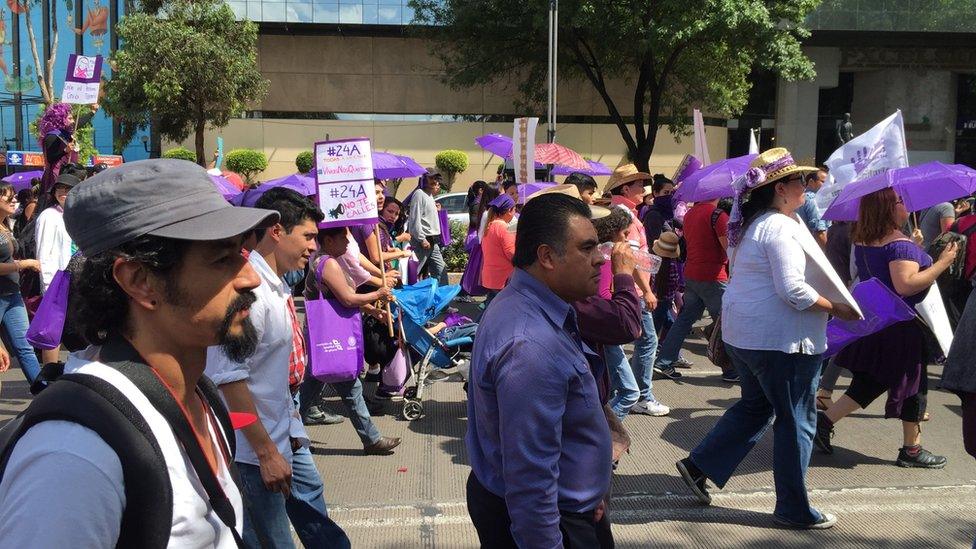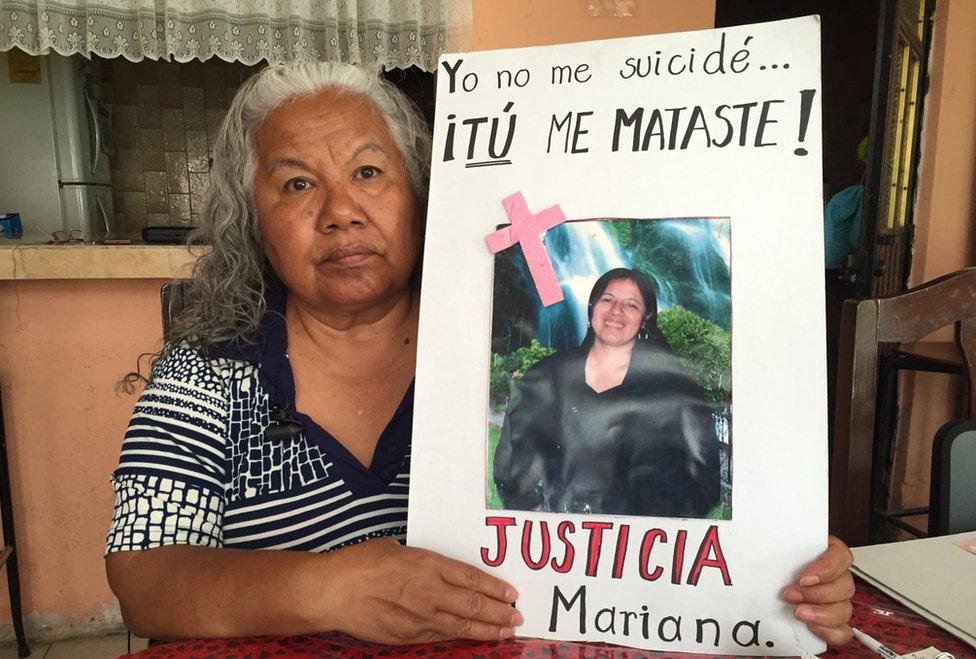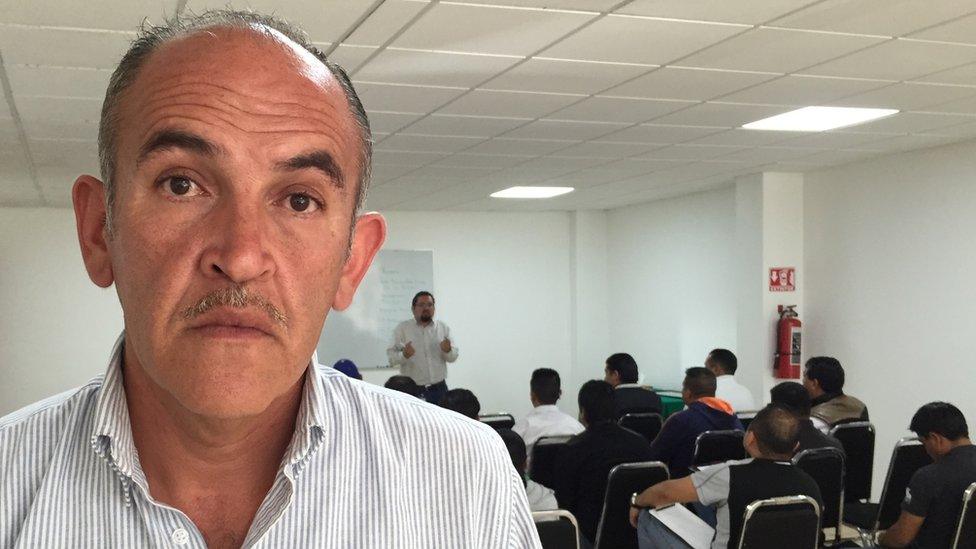Making a noise about machismo in Mexico
- Published
Many Mexicans are fighting to stop all-too-common violence against women
"Machismo has to die," chanted protesters as they walked through the centre of Mexico City last month.
Thousands of people came out onto the streets to say enough was enough.
The macho culture is all pervasive in Mexico and many of those at the march think its emphasis on male pride is a contributing factor in the high rates of violence against women that Mexico is experiencing.
It is estimated that nine out of 10 women, external (link in Spanish) have been subjected to sexual violence, whether on the streets or at home.
'Tired of the violence'
"I'm here because I'm tired of the violence against women in Mexico," said Ana Carlota Velazquez, a student.
"I'm tired of living it and hearing it happen to my friends, in the streets, on public transport, in university and at work."
Guatemala: Where women are killed by their families
Marchers in Argentina condemn domestic violence
Brazil femicide law signed by Rousseff
Struggling with sexism in Latin America
The women were joined by thousands of men. Many were carrying placards.
"I need feminism too", read one. Another read: "Because she's my sister, my girlfriend, my wife."
Femicide
"We want to stay alive," other protesters shouted.
The extreme end of gender violence is femicide, the intentional murder of a woman because she is a woman.

Mexicans fed up with high levels of violence against women took to the streets
It is a particular problem in Mexico. According to the country's National Commission to Prevent and Eradicate Violence against Women (CONAVIM), on average six women die a violent death each day, external (link in Spanish) in Mexico.
Accurate figures are hard to come by. States differ in the way they collect data and in how honest they are with the figures.
Even CONAVIM admitted getting accurate data was a challenge.
This is made harder by the fact that it is hard to prove that a murder was committed because gender alone. As a result, femicides are massively under-reported.
In a country where up to 99% of crimes go unsolved, many victims' families often do not go to authorities for help because they believe it will not change anything.
Murdered in Mexico State

Irinea Buendia's sign which shows a photo of her daughter translates as: "I did not kill myself. You killed me"
Ciudad Juarez used to be known as the most violent city in Mexico, a city where hundreds of women went missing.
But Ecatepec, part of poor Mexico State on the edge of the capital, has now surpassed the reputation Ciudad Juarez once had.
Irinea Buendia lives in Mexico State, not far from Ecatepec. She says her daughter Mariana was killed by her husband.
He had a history of violence and had threatened to kill her. But when Mariana was found hanged in the marital home, her death was recorded as a suicide.
"The first thing they say is 'what did you daughter do for him to treat her like that? What did she do to make him kill her?'," Ms Buendia tells me.
"But men don't own women. Just because there's a problem in a relationship or in a marriage doesn't mean that murder is the answer."
Therapy - is it hard to be a man?
On the other side of Mexico state, a workshop is trying to tackle the root of the problem.
A group of men - and two women - are sitting in a classroom, with a psychologist at the whiteboard.
"Is it hard to be a man?" he asks the class.
There is a real mix of responses from the participants. One breaks down as he tries to explain his point of view.
Another says no, if you know how to behave decently, it should not be hard at all.
One of the participants, Alberto Trinidad Martinez Nava, was sentenced to 28 years in prison for raping and killing two women.
He is now free and says his attitude has changed.
"It was all about me," he says. "Machismo - it was just me, me, me. I belittled women. I had that bad attitude that women would be under my control but I know that not to be true now."
'Violence is accepted'
"If we only focus on the victim, the perpetrator will continue to be violent in new relationships," says Marisol Zarco Reyes, a psychologist at Mexico State Council for Women.
"Sadly, perpetrators of domestic violence are born seducers so they finish one relationship and move on to the next so we saw the need to focus on them, too."

Alberto Trinidad Martinez Nava served a prison term for the rape and murder of two women
"Getting them to admit they are the perpetrators of violence is half the process," says Ms Zarco.
"Unfortunately in our society, violence is accepted. They are taught that violence is the way to keep power."
The issue of gender violence is a worldwide problem but Ms Zarco says there is a cultural problem particular to Mexico, too.
"Machismo is a hegemonic model of masculinity in Mexico," she says.
"The man who shouts, who has to hit people to show his power. Yes, there's machismo in Mexico."
'Ongoing struggle'
The workshop is part of a bigger initiative called Mexico State for a Life without Violence, which supports women who are vulnerable to domestic abuse.
According to a victims' agency run by the government, 90% of victims of sexual violence are women.
And for women like Ms Buendia, the struggle against the culture of violence goes on.
After five years of campaigning, the Mexican Supreme Court last year ordered her daughter's death to be re-investigated from a gender perspective.
It is a move that Ms Buendia thinks could be hugely significant for many other cases that have also not been investigated as femicides.
These are small steps in a country where a lack of resources - and many say a lack of will - have meant crimes against women have gone unpunished.
But they are progress nonetheless.